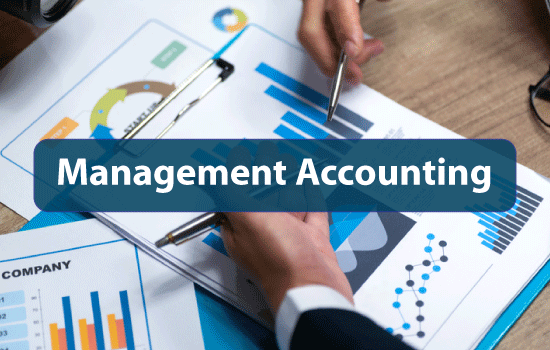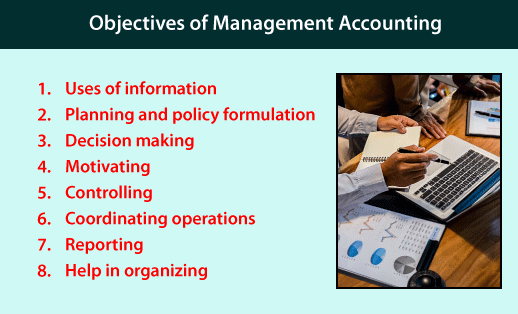Objectives of Management AccountingMeaning of Management AccountingThe goal of management accounting is to use statistical data to make better and more accurate decisions about the enterprise, business activities, and progress. Management accounting is solely used by the organization's internal team, which is the only difference between it and financial accounting. During this procedure, the finance administration shares financial information and reports with the company's management team, such as invoices and financial balance statements. 
Management Accounting's ObjectiveThe function of management accounting is entrusted to a person referred to by many words such as a financial controller, financial manager, controller, and so on. Management accounting takes a broader perspective; assisting management becomes more accurate and exact. It is more concerned with the impact and effect of costs. It assists management in resolving the company's operating issues. It seeks to give accounting information to assist management in policy formulation and boost operational efficiency to maximize profits or decrease losses of the undertaking. Management accounting takes a forward-thinking approach. It is more predictive than cost accounting. It delivers a wealth of information to management to make informed judgments. It aids management in budgeting and budgetary control and production, planning, and control. Decision-making is a critical component of management, and it is heavily reliant on accounting data. Various objectives of management accounting are given below: 
1. Assisting in the Planning and Formulation of Future PoliciesProper planning, which is the core job of management, is critical to business success. It entails thoroughly examining available data and forecasting based on that data. When the date is placed in the right context, it aids management's ineffective planning. Management accounting provides costing and statistical data that can be used to set goals and create policies. The financial accountant offers relative numbers from the past and forecasts for the future. These aid management in deciding on courses of action and the company's program of activities. Management accounting aids in planning for a specific objective and overall organization planning. 2. Assisting with the Understanding of Financial DataManagement accounting focuses on analysing and interpreting data, which has opened up new avenues. It is concerned with keeping records of past accomplishments, maintaining values, establishing duties, and providing a foundation for helping future development. Management accounting delivers accounting information in an understandable style that allows corporate executives, investors, and creditors to analyze and evaluate financial statements. The financial accountant keeps a complete record of all transactions involving the organization's assets, creditors, claims, owners, and equity. For revenues and costs, for example, the management may not have the time to shift through the information presented in its raw form. 3. Assist in Performance ManagementManagement accounting assists management in directing the organization's destiny by maintaining performance criteria and measuring and estimating deviations from them. Actual performance is measured against approved operating plans, standards, and budgets, which are interpreted and reported to me by department leaders at higher levels. All of this assist's management in maintaining total control of the organization's performance. Management may quickly and successfully delegate authority using cost control strategies and functional control. 4. Assisting with OrganizationMarketing management places a premium on budgetary control and marginal costing. Standard costing and a cash flow analysis Internal financial control, for example. All of this necessitates a thorough examination of the organizational structure. It aids in more efficiently streamlining the organizational structure of the commercial concern. 5. Helpful in Resolving Strategic ProblemsDecision-making is largely a management activity. Accounting assists managers in making effective business decisions. These decisions may pertain to business expansion, contraction, diversification, or establishing a new line of business. All of these issues are addressed by management accounting. Management accounting uses accessible accounting statistics to solve a variety of management difficulties. Its purpose is to offer vital facts, not to make decisions. It simply informed management and delegated decision-making authority to them. It develops and exposes various plans comparably and provides insight into the implications for the organization's future. It is up to management to close the best course of the section using the available information provided by management accounting. It is an essential tool for marginal costing, cost volume, profit analysis, standard costing, and capital budgeting and helps managers to make sensible and sound judgments. Management accounting, according to Anthony, is "the application of accounting statistics in the recognition or resolution of management problems." 6. Information ExchangeAccounting is the language used to communicate financial information about an organization and its activities to people who want to put them to good use by interpreting them. It boosts the company's efficiency and aids management in its goal of increasing profits or minimizing losses. Management accounting is a tool for communicating management plans within a company. It is an essential component of the company's management information system. 7. Assisting in Employee MotivationGoal setting and good planning, employing a cost-effective strategy and assessing performance go a long way toward enhancing and increasing the organization's effectiveness. As a result, management accounting assists management in encouraging their staff. 8. Coordination AssistanceManagement accounting is concerned with the efficiency of the many management phases; it aids in the overall and correct coordination of corporate operations, with budgets serving as the most effective form of coordination. The various plans are based on a budget, a financial statement of plans. Following the planning, the planned operations are directed, coordinating the actions of various departments and units and controlling the operations to meet the desired goals. Thus, management accounting is a tool whose goal is to extend financial and statistical information to cast light on all aspects of the organization's activities. For this goal, it employs methodologies like as marginal costing, cost volume profit analysis, standard costing, and capital budgeting, among others, to assist management in making good rational decisions.
Next TopicWhat is PE in Share Market
|
 For Videos Join Our Youtube Channel: Join Now
For Videos Join Our Youtube Channel: Join Now
Feedback
- Send your Feedback to [email protected]
Help Others, Please Share










